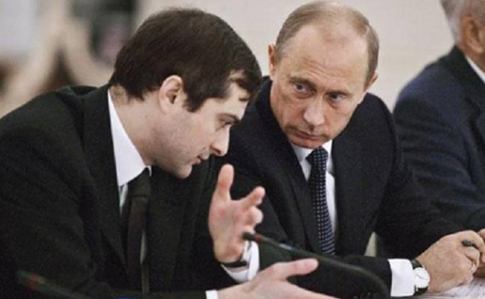Russia’s war against Ukraine is just ‘physics’, former Putin aide asserts

Russia needs to send war and destruction to Ukraine to maintain ‘stability’ in Russia and prop up the current regime, under President Vladimir Putin. That is according to Vladislav Surkov who was, at least until early 2020, Putin’s aide and who is believed to have been in charge of the self-styled ‘republics’ in occupied Donbas. Surkov’s article, published on 20 November 2021, is the latest of a series of incriminating revelations from prominent Russian players which obligingly give the lie to the Kremlin’s attempts to pass off the conflict in Ukraine as a ‘civil war’.
In his assessment of Surkov’s latest opus, Moscow-based philologist and commentator Gasan Guseynov suggests that the current Russia regime should probably ban Surkov’s philosophical outpourings as soon as they’re written. They are just too open in exposing “the mechanism for taking key political decisions that has brought the Russian Federation to its present woeful condition.” And even more dangerous, he says, is that reading these works, Russia’s enemies will discover the immediate and even long-term plans of the regime. The work certainly leaves little to the imagination as far as Ukraine is concerned.
As well as throwing in the German philosopher Georg Willhelm Friedrich Hegel and 20th century mathematician and philosopher Kurt Gödel, Surkov bases his claims about social and political developments on the laws of physics, and specifically the second law of thermodynamics. In Surkov’s rendition, this states that “entropy in a closed system increases. In other others, chaos (disorder) never diminishes, but on the contrary almost always increases. And one consequently observes everywhere a chronic reduction in order and stability against a background of progressive turbulence and decay”.
He claims that at the beginning of the XXI century (i.e. with the coming to power of Putin), the “avalanche of social chaos” was stopped and that there has been 20 years of ‘stability’ which may one day, he claims, be viewed as “a golden age”.
There is, however, a bit ‘but’, which is where Ukraine comes into the picture. If the theory of thermodynamics is correct (and it is), he says, disorder must inevitably increase, with this referred to as “social entropy”.
“Social entropy is very toxic. It’s not advisable to work with it in our domestic conditions. It needs to be taken out somewhere far away. To be exported for disposal on foreign territory. <> All empires do this. Over the centuries the Russian state with its harsh and sedentary political interior was retained solely thanks to its ceaseless aspirations beyond its own borders. It has long forgotten, and probably never knew how to survive any other way. For Russia, constant expansion is not simply one of the ideas, but the existential reality of our historic existence”.
Here, of course, is where Ukraine comes in. Surkov specifically cites the example of Crimea, although avoiding any mention of the Russian soldiers without insignia who invaded and seized control of the peninsula, or words like annexation and occupation. No, in Surkov’s language, this was the supposed “Crimean consensus” which he describes as “a clear example of the consolidation of society at the expense of the chaotization of a neighbouring country”.
Ukrainian journalist Denis Kazansky called this “an admission of guilt”, and certainly, if you strip the words of their gloss, you are left with something that directly contradicts the Kremlin’s excuses both for invading Crimea, and for Russia’s aggression in Donbas. The narrative has always been that Ukraine was seized by ‘fascists’ and had descended into chaos. Any Russian intervention was merely ‘help’, aimed at saving Russian-speakers, Crimeans, Donbas residents, etc. from this chaos, not exporting it from Russia to Ukraine.
Given Surkov’s wish to export all that is chaotic abroad “for disposal”, it is worth recalling the recent revelations of far-right Russian nationalist, Dmitry Demushkin. In at least two interviews, first in May 2021, then in August, Demushkin recounted how he had been approached by the then Russian Deputy Prime Minister, Dmitry Rogozin to gather nationalists to fight in Ukraine.
Demushkin refused, explaining in the second interview that, firstly, he does not recognize the ‘fight for a Russian World’ outside the Russian Federation. His second reason is highly telling. Like Putin, Demushkin’s chauvinist nationalism claims that Russians and Ukrainians are one and the same people. Unlike Putin, that for Demushkin means that Russians should not go to Ukraine to kill Ukrainians. He and his people also understood, he says, that they would simply be sent to Donbas as cannon fodder, and that, even those who were not killed, would not be able to return. In short, they understood, that they were being sent “for disposal”, and essentially spells out the reasons. He explained that they were the most talked about ‘nationalists’ in the media, and their very existence, the ‘Russian March’ and other headline-making nationalist events did not gel well with Moscow’s repeated attempts to present the new government in Kyiv as ‘fascist’. Better to get rid of them by sending them to Ukraine where they can be of use to Moscow by killing Ukrainians. Demushkin asserts that he was first subjected to torture as the FSB’s force of ‘persuasion’, and that the series of prosecutions and terms of imprisonment were a direct consequence of his refusal to cooperate.
More details, including about the Russian neo-Nazis, etc., who almost certainly arrived in Donbas by similar means, here.
There certainly were indications back in Aoril 2014 that the Kremlin was hoping to achieve the same blitzkrieg in Donbas (and, probably, Odesa) as in Crimea. Having failed, Moscow has settled for the second-best described by Surkov, namely maximum destabilization and destruction.





